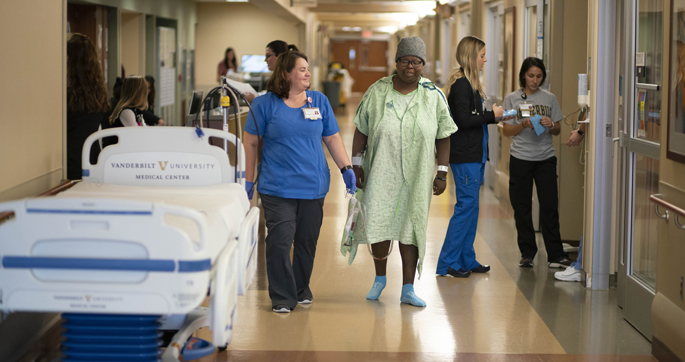The Transition Management Office at Vanderbilt University Medical Center holds to the principle that every patient should know what will happen next in his or her care, when it will happen, who will be involved and what the costs will be.
A new VUMC initiative seeks to apply this principle more consistently for patients undergoing elective surgery.
“Improving care coordination is critically important in the changing landscape of health care,” said Donna Cella, R.N., MMHC, a project manager with Transition Management. “Preoperative patient education is too often limited to the procedure and pre-hospital routine. Coordination improves when the preoperative patient understands what the care requirements will be at discharge and has time to plan.”
Before major elective surgery, surgeons are able to estimate the length of the hospital stay and the likelihood that the patient will need a nursing home or rehabilitation hospital. They’re also able to anticipate care requirements once the patient is back home. Educating patients about these matters in the clinic— preoperatively — can help smooth transitions to post-acute care.
Conversely, failure to alert patients ahead of time about these matters can contribute to needlessly delayed hospital discharge, which means decreased consumer access to care and lost business for the hospital.
Earlier this year, Neurosurgery and Colorectal Surgery services conducted pilot projects on this theme, developing strategies and tools that will roll out across other adult surgical services beginning early next year. In the rollout, clinic and hospital teams that serve the same patients will meet to set clear guidelines for post-acute coordination for their patients.
Here are some of the likely changes (some VUMC surgical clinics already do these things):
• Family members and friends who are planning to act as post-discharge caregivers will attend preoperative patient teaching in the clinic.
• Clinic teams will schedule surgical follow-up visits prior to surgery.
• Clinic teams will initiate discharge planning preoperatively. In the VUMC electronic medical record, clinic teams will document the anticipated length of the hospital stay, contact information for the patient’s post-discharge caregiver and primary care provider, dates of surgical follow-up appointments, a scan of the patient’s pharmacy benefits card and the anticipated discharge disposition — that is, home, nursing home, rehab hospital, home care services, etc. Inpatient case managers and social workers will work from this plan.
• Clinics will encourage any patients who lack a primary care provider to find one.
• Clinic nurses may participate in the hospital’s patient transition huddles.
• Inpatient teams and clinic teams will undertake postsurgical nursing patient handovers.
The initiative is sponsored by Transition Management, the Patient Flow Center and Vanderbilt Medical Group Systems Engineering.















